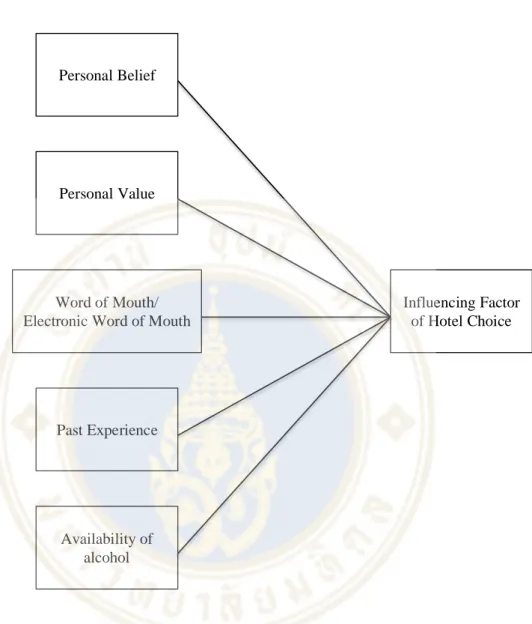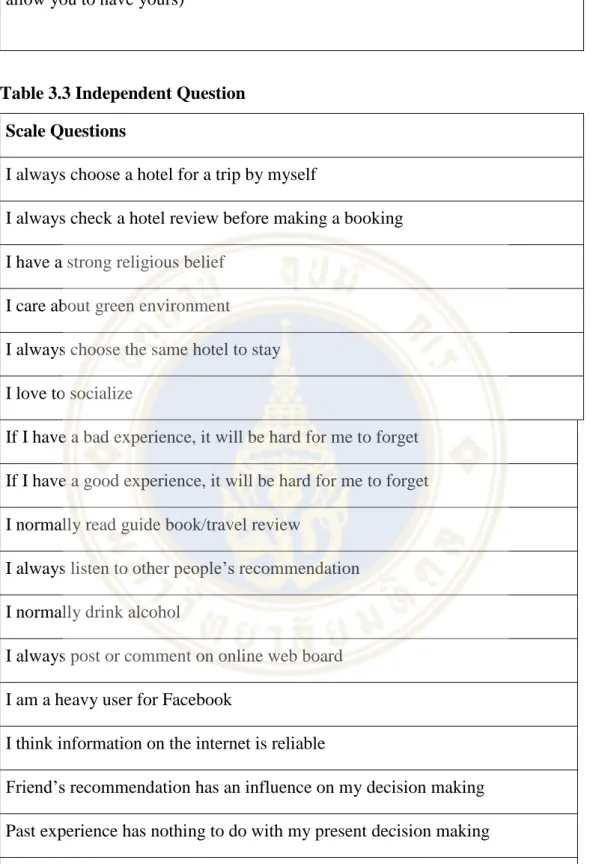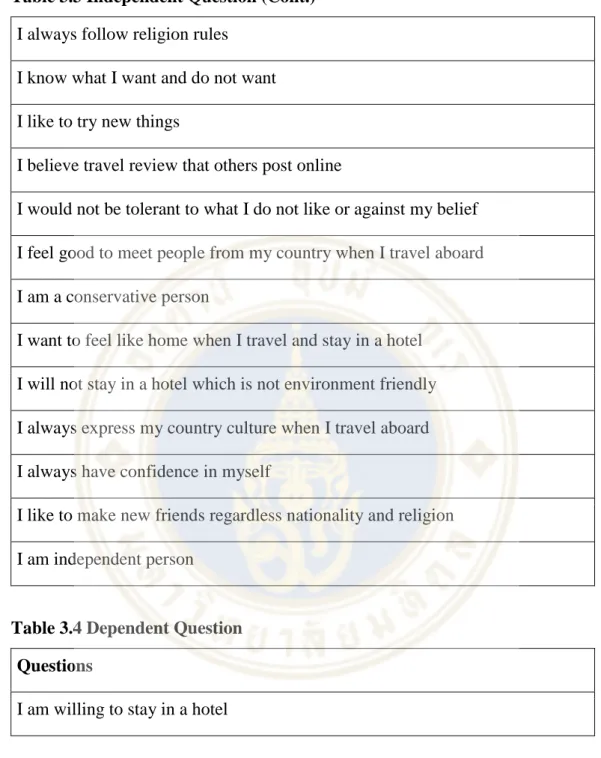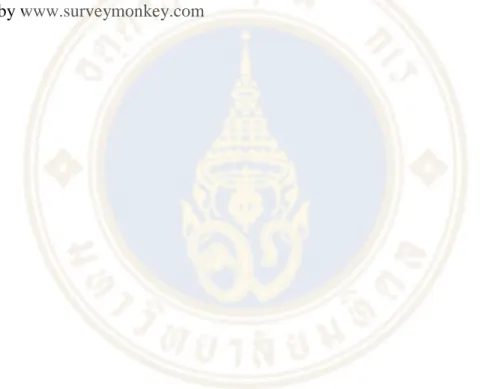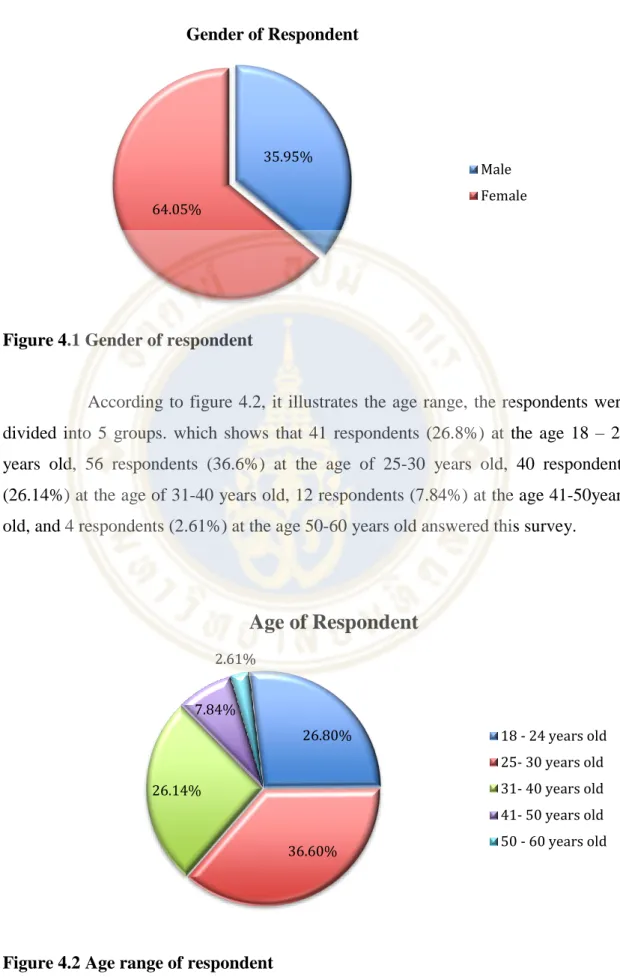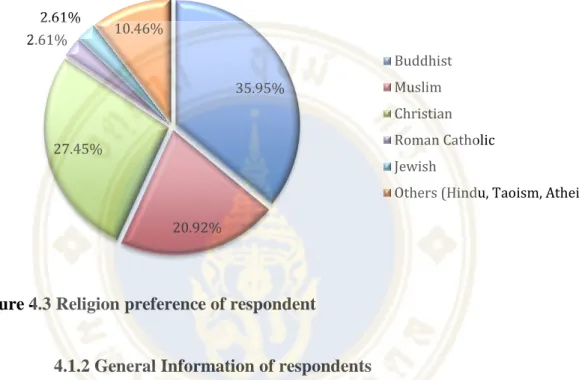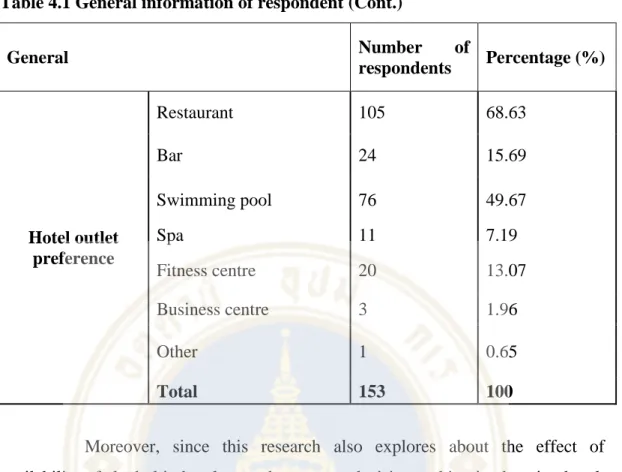Moreover, I want to thank my friends and cousins who helped me in distributing the questionnaire and collecting the data. The purpose of this research is to examine which factor can influence the consumer's decision-making in choosing a hotel. The study found that trust and personal reference have a strong influence on the consumer's decision-making in choosing a hotel.
Furthermore, it was proven that the availability of alcohol in a hotel has no influence on consumer decision-making in choosing a hotel. Since F&B is one of the main businesses that generate revenue for the hotel (about 100-200% margin for beverages), the unavailability of alcohol will naturally make the business less profitable. The purpose of this study is to find out which factors can influence consumers' decision to choose a hotel.
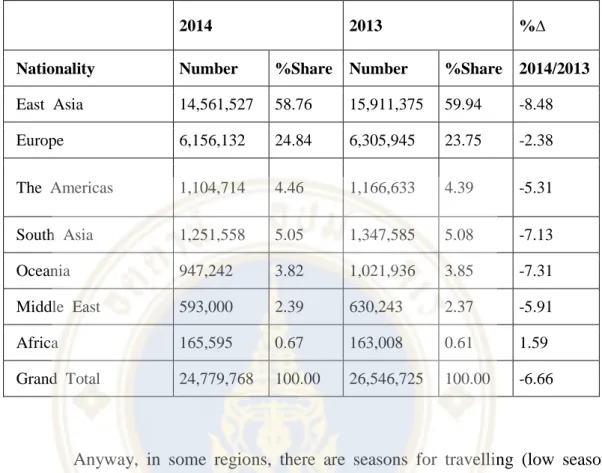
LITERATURE REVIEW AND HYPOTHESIS
Literature Review
In the study about the influence of religion on US Muslim tourists' intention to choose a Sharia-compliant hotel (Figure 2.1), Maloud identified that Muslims avoid going to places where they feel they may be physically or verbally abused if they do. were easily noticed that they were Muslims. In the past, word of mouth (WOM) was a very fast way to spread news, but now that we have the IT tool and channel, electronic word of mouth is even more powerful and effective. It appears that past experience has a cumulative effect on decisions: an individual may keep his insurance demand constant after one loss event and modify it only after two or more consecutive loss events.
In line with this assumption, Morgan (1991:44) states that the memory can be associated with either negative or positive evaluation and feeling, depending on the previous experience. Lehto concludes his study on the effect of past destination experience on current travel behavior researched on German and British travelers that there is no clear evidence showing that past experience can influence current decision making 100%. The study found that for German travelers, prior experience was a strong predictor of risk reduction activities such as travel planning activities.
Framework
Hypotheses
H3: Word-of-mouth and electronic word-of-mouth will have a positive relationship on consumers' decision making when choosing a hotel. H5: The availability of alcohol in hotels will positively influence consumers' decision making when choosing a hotel. H6: Consumer gender will have a positive relationship with willingness to stay in an alcohol-free hotel.
H7: The consumer's age will have a positive relationship with their willingness to stay in an alcohol-free hotel.
METHODOLOGY
Research Design
Population and sample size
Research Instrument
- Constructs Measurements
- Questionnaire design
- Questionnaire Question
- Data collection
Friend's recommendation influences my decision making. Past experiences have nothing to do with my current decision making. I wouldn't be tolerant of what I don't like or against my beliefs, I feel good meeting people from my country when I travel on board. I am a conservative person. I want to feel at home when I travel and stay in a hotel. I will not stay in a hotel that is not environmentally friendly. I always express my country's culture when I travel on board. I always have confidence in myself.
153 questionnaires were distributed using both paper and online tools, but they were returned 153 questionnaires. The questionnaires were distributed to tourists staying in hotels in Krabi provinces.
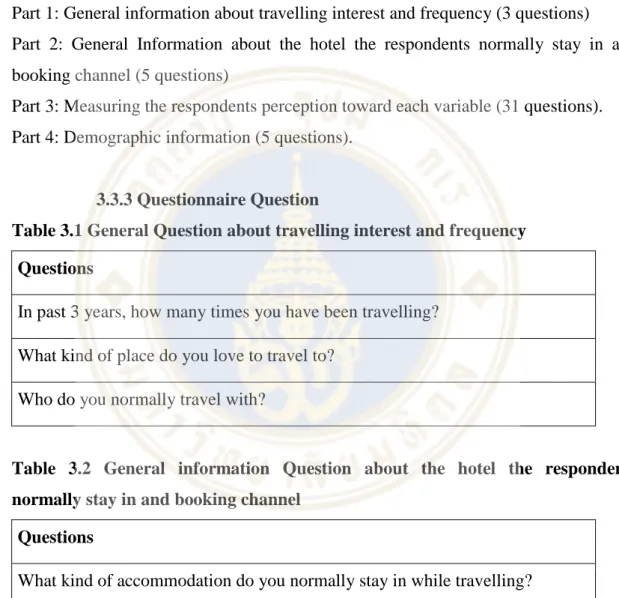
RESEARCH FINDING AND ANALYSIS
Research finding
- Demographic of respondents’ information
Age of Respondent
General Information of respondents
However, the researcher excluded 4 respondents who had not traveled at all in the last 3 years from the survey analysis. In addition, it shows that 79 respondents (51.63%) use an online travel agency to find hotel information, 33 respondents (21.57%) use a travel website, and 16 respondents (10.46%) use family and friends. An online travel agent is the first channel of choice for booking hotels, 110 out of 153 respondents (71.9%) use only a travel agent for booking.
Out of 153 survey respondents, the respondent who is willing to stay in an alcohol-free hotel is 128 persons (83.66%), while the number of respondents who will not stay in an alcohol-free hotel is 25 persons (16.34%).
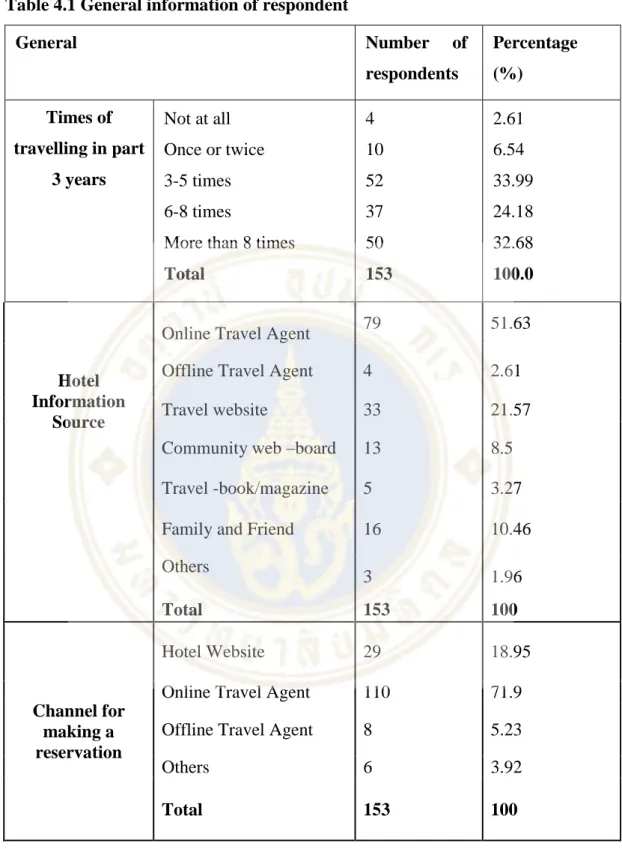
Factor Analysis
- Total variance explained
- Scree Plot
- Rotated Component Matrix
- The result after dimension reduction
Table 4.3 shows 7 important factors that can influence the consumer's decision when choosing a hotel. The scree plot showed 7 important factors that are important to the consumer's decision making when choosing a hotel, as it is shown that from the 8th graph the line is almost flat because these factors account for a smaller amount of total variance. The rotated components matrix in Table 4.4 shows the level of contribution of each variable to each construct.
However, there are five questions with data load, so the researcher runs the dimensionality reduction to get more accurate information. In this study, Table 4.5 in the Rotated component matrix after dimension reduction showed three factor dimensions that influence consumers' decision-making in connection with choosing a hotel. Personal value: relevant to what is important to the individual, such as independence, acceptance, trust, etc.
The results of the factor analysis illustrate that some variables are omitted due to the insignificant level of contribution, while there is also a new group of variables. Thus, the previous hypotheses, H3: Word of Mouth, will have a positive relationship with consumer decision-making when choosing a hotel, and H4: Past Experiences. Moreover, the researcher tested the new hypotheses of this study through multiple regressions with the regrouped constructs from the factor analysis to see the factor that can influence consumers' decision making in choosing a hotel.
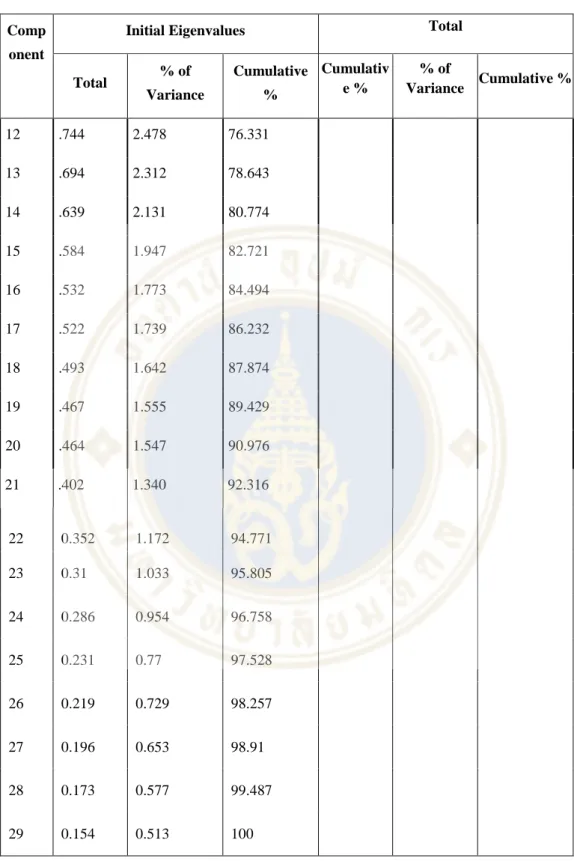
Multiple Regression Analysis
- Model summery of running Multiple regression
- Coefficients result of running Multiple regression
- ANOVA result of running Multiple regressions
The result in Table 4.6 of the summary of the three-construct model regarding the consumer's intention to stay in the hotel shows that the adjusted r square was 1.1%. The result in Table 4.7 shows that there are only two constructs that have a positive relationship with consumer willingness to stay in a hotel. The personal belief that it will have a positive influence on the consumer's decision-making when choosing a hotel is rejected.
The result in Table 4.11 of the summary of the Model of the two constructs of the factors that can influence the decision-making of the consumer in choosing a hotel illustrates that the adjusted r-square was equal to 11.6%. From Table 4.9: Multiple Regression Run Coefficients, the results showed that both personal values and reference have a positive relationship with consumer decision making in choosing a hotel. So, the hypothesis H2: Personal value will have a positive relationship in the decision-making of the consumer in choosing the hotel is accepted.
So, this new hypothesis H8: Reference will have a positive relationship in consumer decision making in hotel selection is accepted. From Table 4.10, the ANOVA test between the difference in consumer gender and willingness to stay in a non-alcohol hotel, the result showed that the Sig value score is 0.918 which is higher than 0.05 level of significance. It can be concluded that the difference in gender has no influence on the consumer's willingness to stay in an alcohol-free hotel.
Therefore, H6: The consumer's gender will have a positive effect on his willingness to stay in an alcohol-free hotel is rejected. From Table 4.11, ANOVA testing between the difference in age of the consumer and the willingness to stay in a hotel without alcohol. We can conclude that there is no difference between the age of the consumer and the willingness to stay in a hotel without alcohol.
Therefore, H7: The consumer's age will have a positive effect on their willingness to stay in an alcohol-free hotel is rejected.
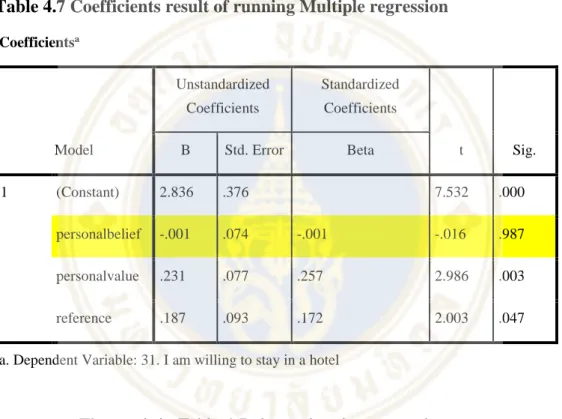
Hypotheses Summary
H5: The availability of alcohol in the hotel will have a positive relationship with consumers' decision making when choosing a hotel. This research focused on the factor that can influence customers' decision making in choosing a hotel. According to literature review, there are four assumptions that the research used as variable for this study which are personal value, personal belief, word of mouth/electrical word of mouth and previous experience.
The study was proposed and tested using SPSS program and conducting exploratory factor analysis and multiple regression analysis. In addition, to answer another question from this study about the effect of alcohol availability in a hotel on consumers' decision making when choosing a hotel, the researcher tested this topic using One-way ANOVA analysis . The results showed that the majority of the age groups were between 25 and 30 years old, with 56 respondents and 41 respondents in the age range of 18 to 24 years old.
The most influential factors in the consumer's decision-making in choosing a hotel are personal values and references.
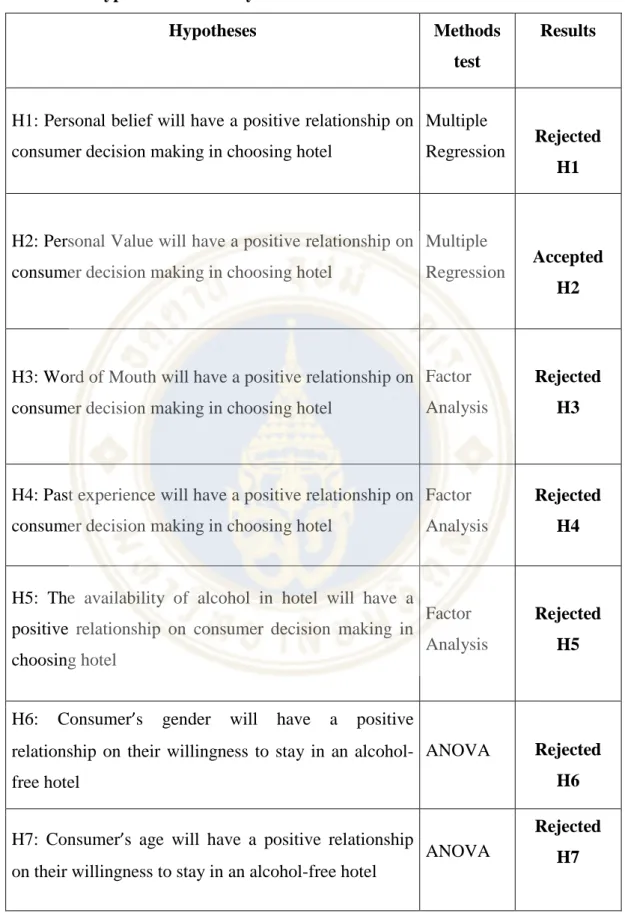
Conclusions
From the result, the response of the respondents showed that references from many sources such as guidebook, online travel review and personal recommendations are very important and can influence the decision of the consumer when choosing a hotel. Finally, the study found that the availability of alcohol in a hotel is not related to a consumer's willingness to stay in a hotel. 128 respondents out of 153 respondents or 83.66% of all respondents stated that they would stay in an alcohol-free hotel.
Furthermore, gender and age have no relation to consumers' willingness to decide to stay in an alcohol-free hotel.
Recommendations and Practical Implications
Furthermore, the study also shows that there is no significant relationship between the availability of alcohol and the consumer's intention to stay in a hotel. Thus, regardless of the income from the F&B department, the Muslim-owned hotel with a no-alcohol policy can be confirmed that this factor will not affect the hotel's competitive advantage. Management can promote their F&B outlet as a healthy station by highlighting healthy drinks.
In addition, the hotel can advertise itself as a healthy concept hotel and attract the target customer by combining the package with other wellness activities in the hotel, such as the spa.
Limitations
Future research
This study will help the investor to see the opportunities in doing business and can also develop the understanding of the culture of their Muslim customer both from Thailand and other countries so that they can plan their business and marketing strategy properly.
Appendice
